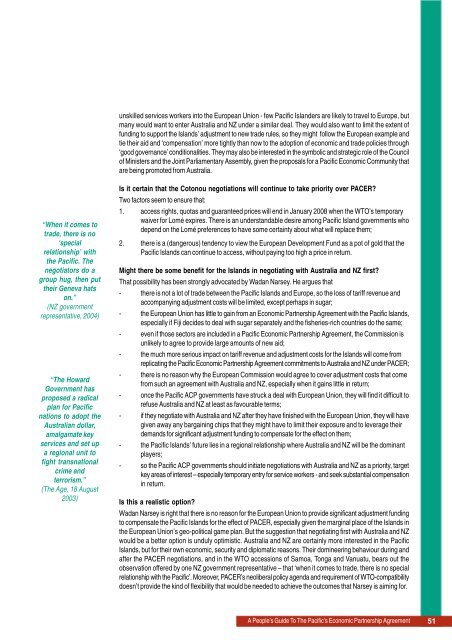REPA Booklet - Stop Epa
REPA Booklet - Stop Epa
REPA Booklet - Stop Epa
You also want an ePaper? Increase the reach of your titles
YUMPU automatically turns print PDFs into web optimized ePapers that Google loves.
unskilled services workers into the European Union - few Pacific Islanders are likely to travel to Europe, but<br />
many would want to enter Australia and NZ under a similar deal. They would also want to limit the extent of<br />
funding to support the Islands’ adjustment to new trade rules, so they might follow the European example and<br />
tie their aid and ‘compensation’ more tightly than now to the adoption of economic and trade policies through<br />
‘good governance’ conditionalities. They may also be interested in the symbolic and strategic role of the Council<br />
of Ministers and the Joint Parliamentary Assembly, given the proposals for a Pacific Economic Community that<br />
are being promoted from Australia.<br />
“When it comes to<br />
trade, there is no<br />
‘special<br />
relationship’ with<br />
the Pacific. The<br />
negotiators do a<br />
group hug, then put<br />
their Geneva hats<br />
on.”<br />
(NZ government<br />
representative, 2004)<br />
“The Howard<br />
Government has<br />
proposed a radical<br />
plan for Pacific<br />
nations to adopt the<br />
Australian dollar,<br />
amalgamate key<br />
services and set up<br />
a regional unit to<br />
fight transnational<br />
crime and<br />
terrorism.”<br />
(The Age, 18 August<br />
2003)<br />
Is it certain that the Cotonou negotiations will continue to take priority over PACER?<br />
Two factors seem to ensure that:<br />
1. access rights, quotas and guaranteed prices will end in January 2008 when the WTO’s temporary<br />
waiver for Lomé expires. There is an understandable desire among Pacific Island governments who<br />
depend on the Lomé preferences to have some certainty about what will replace them;<br />
2. there is a (dangerous) tendency to view the European Development Fund as a pot of gold that the<br />
Pacific Islands can continue to access, without paying too high a price in return.<br />
Might there be some benefit for the Islands in negotiating with Australia and NZ first?<br />
That possibility has been strongly advocated by Wadan Narsey. He argues that<br />
- there is not a lot of trade between the Pacific Islands and Europe, so the loss of tariff revenue and<br />
accompanying adjustment costs will be limited, except perhaps in sugar;<br />
- the European Union has little to gain from an Economic Partnership Agreement with the Pacific Islands,<br />
especially if Fiji decides to deal with sugar separately and the fisheries-rich countries do the same;<br />
- even if those sectors are included in a Pacific Economic Partnership Agreement, the Commission is<br />
unlikely to agree to provide large amounts of new aid;<br />
- the much more serious impact on tariff revenue and adjustment costs for the Islands will come from<br />
replicating the Pacific Economic Partnership Agreement commitments to Australia and NZ under PACER;<br />
- there is no reason why the European Commission would agree to cover adjustment costs that come<br />
from such an agreement with Australia and NZ, especially when it gains little in return;<br />
- once the Pacific ACP governments have struck a deal with European Union, they will find it difficult to<br />
refuse Australia and NZ at least as favourable terms;<br />
- if they negotiate with Australia and NZ after they have finished with the European Union, they will have<br />
given away any bargaining chips that they might have to limit their exposure and to leverage their<br />
demands for significant adjustment funding to compensate for the effect on them;<br />
- the Pacific Islands’ future lies in a regional relationship where Australia and NZ will be the dominant<br />
players;<br />
- so the Pacific ACP governments should initiate negotiations with Australia and NZ as a priority, target<br />
key areas of interest – especially temporary entry for service workers - and seek substantial compensation<br />
in return.<br />
Is this a realistic option?<br />
Wadan Narsey is right that there is no reason for the European Union to provide significant adjustment funding<br />
to compensate the Pacific Islands for the effect of PACER, especially given the marginal place of the Islands in<br />
the European Union’s geo-political game plan. But the suggestion that negotiating first with Australia and NZ<br />
would be a better option is unduly optimistic. Australia and NZ are certainly more interested in the Pacific<br />
Islands, but for their own economic, security and diplomatic reasons. Their domineering behaviour during and<br />
after the PACER negotiations, and in the WTO accessions of Samoa, Tonga and Vanuatu, bears out the<br />
observation offered by one NZ government representative – that ‘when it comes to trade, there is no special<br />
relationship with the Pacific’. Moreover, PACER’s neoliberal policy agenda and requirement of WTO-compatibility<br />
doesn’t provide the kind of flexibility that would be needed to achieve the outcomes that Narsey is aiming for.<br />
A People’s Guide To The Pacific’s Economic Partnership Agreement 51
















